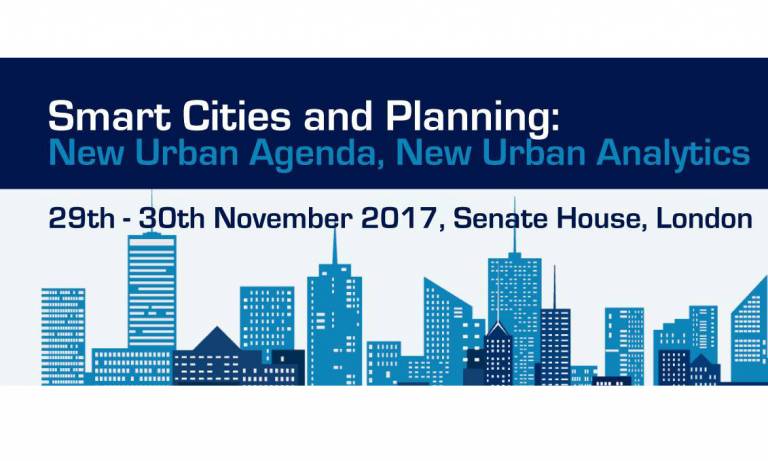Conference: Smart Cities and Planning: The New Urban Agenda, The New Urban Analytics
19 September 2017
An upcoming conference on smart cities at Senate House, University of London, Wednesday 29 November and Thursday 30 November 2017

In this two-day conference we explore the relation and relevance of smart city interventions and analytics to urban needs as expressed in the New Urban Agenda, which was agreed in 2016 at the UN's Habitat III Conference in Quito. To investigate and interrogate these relationships, the project team has identified three core elements of city policy where smart approaches and applications will be considered: governance, effectiveness and transferability.
Governance – what are the conditions that support the delivery of urban? Are there specific arrangements where smart city developments can support and be supported by the NUA which has specific requirements including stakeholder participation and collaboration, the integration of urban and rural areas and the provision of adequate, inclusive, quality public services.
Effectiveness – how can smart city applications best be deployed in implementing and monitoring the NUA programmes? The delivery of the NUA requires effective service design, procurement and management. How can smart city ICT be exploited to support this work without cities becoming over reliant on inflexible technologies. The effectiveness of smart city and urban analytic interventions will depend on their ability to maintain citizen trust and security; how can governance in support of trust and security best be managed transparently?
Transferability – which applications can be used by a wide range of institutions and organizations to benefit localities, cities and their environment and economies? Under the NUA the integration of urban and rural areas requires their networking both socially, economically and electronically. How can the use of electronic links best support the development of the trusted networks required for community cohesion and economic activity? To what extent will the effectiveness of smart city interventions be culturally determined? Can the sensors and controls of the smart city be used effectively to manage and maintain network resilience and city sustainability in areas where supply networks are themselves vulnerable?
This event is designed to open up the debate and aims to include discussants from both practice and academia. The purpose of this conference is to understand the current level of progress and challenges for policy makers and service deliverers in some key areas within the public sector of the UK in the context of the NUA. In bringing together a group of participants who have experience and knowledge in these fields, the project is expecting to identify potentially positive practices, blockages and options for wider roll out.
Confirmed Speakers:
• Michael Batty (Chair of the Centre for Advanced Spatial Analysis, UCL)
• Alaina Harkness (The Brookings Institution)
• Rob Kitchin (Social Sciences Institute (MUSSI), Geography National University of Ireland Maynooth)
• Mark Kleinman (Director, Economic and Business Policy, Greater London Authority)
• Adam Greenfield (Writer and Urbanist)
Confirmed Panel Speakers:
• Rick Robinson (Director of Technology for Amey)
• Janice Morphet (FRTPI, Visiting Professor - The Bartlett School of Planning)
• Andy Hudson-Smith (Director of the Centre for Advanced Spatial Analysis, member of the Greater London Authority Smart London Board)
• Volker Buscher (London-based Director of Digital Services - Arup)
• Ayona Datta (Readrer in Urban Futures at Kings College London)
• Léan Doody (Associate Director and Smart cities lead at Arup)
• Alan Penn (Dean of the Bartlett faculty of the Built Environment, UCL)
• Michael Keith (Director of COMPAS, Co-ordinator of Urban Transformations and Co-Director of the University of Oxford Future of Cities programme)
• Andrew Collinge (Assistant Director Intelligence, Greater London Authority)
This conference is free to attend, however registration is required. Please register online here.
 Close
Close

